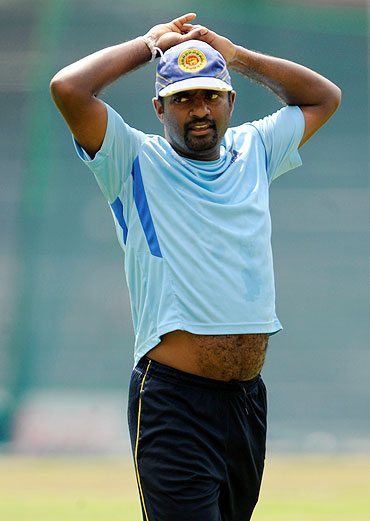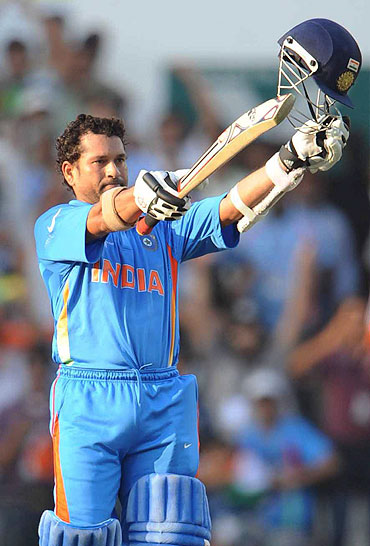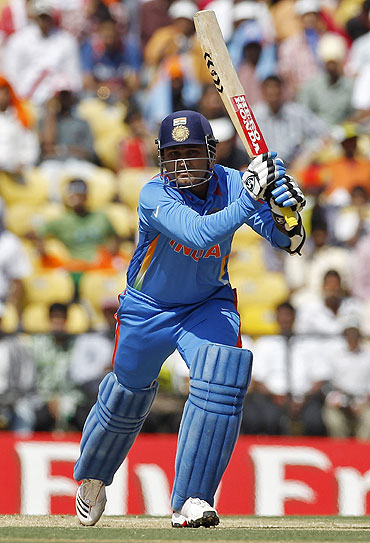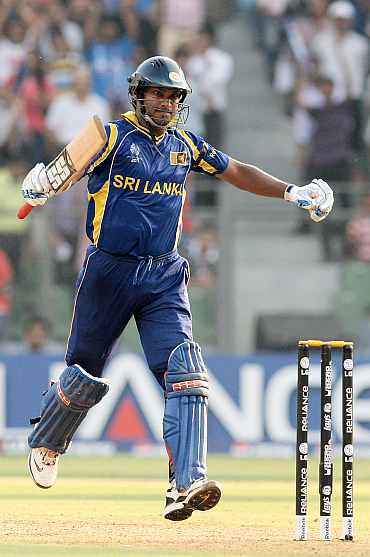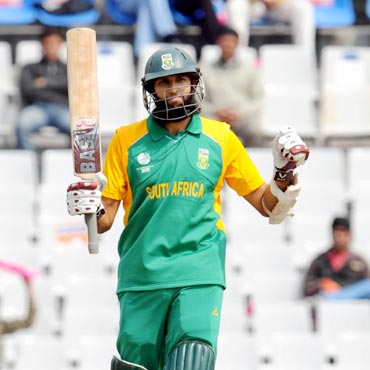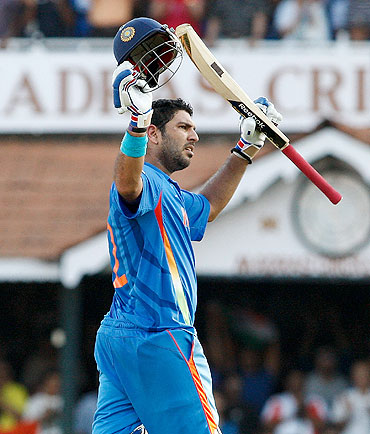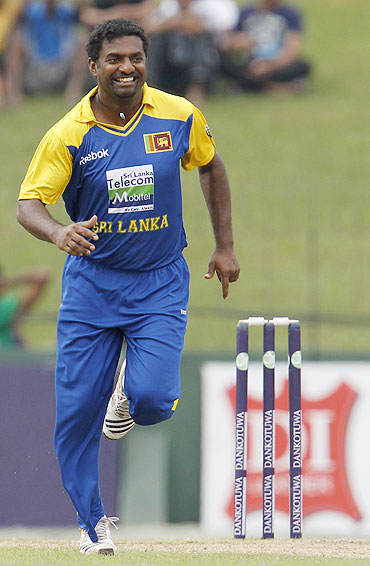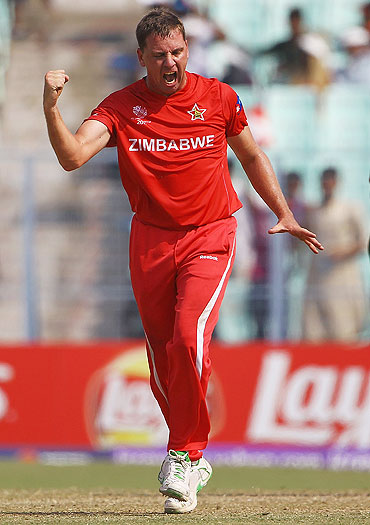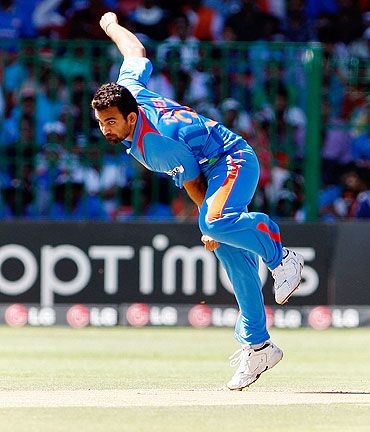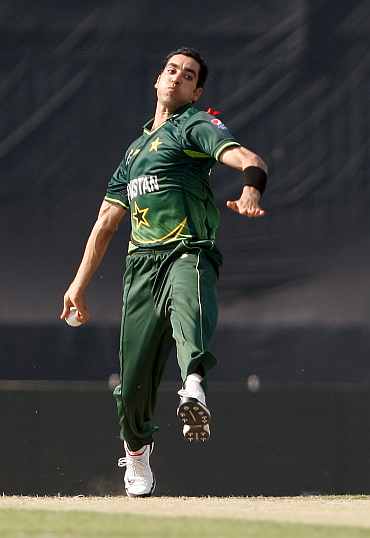 | « Back to article | Print this article |
Murali, Price make it to this Dream Team
Who would feature in your World XI? And why? Please do tell us at the end of this feature.
Before this World Cup began, 400 was touted as the new 300. And supplementary questions ran on the lines of who -- and never if -- will better Sachin Tendulkar's 200*.
The way the tournament opened in Mirpur, where Tendulkar and Sehwag were in such wicked, murderous form that only they are capable of, added credence to this school of thought that batting the opposition out was the only way forward for one-day cricket, and winning this World Cup.
It was almost as if it was going to be a videogame batting innings. The chickenfeed to be programmed, while the batsmen did all the picking. It was almost as if the bowlers did not exist.
But surprise, surprise, a month and 42 matches into the tournament, India's 370/4 against Bangladesh in the opener still stands as the highest total, and Sehwag's 175 is still the highest score.
The Battering Baboons of Batting might do well to note that Andrew Strauss's 158 is the only other 150-plus score in this tournament so far.
So, what went wrong? Nothing, but for the small matter that the bowlers turned up and did their thing.
Ray Price needled, hustled and crippled the feared Aussie top order, Umar Gul unleashed his toe-seeking guided missiles on anyone who dared -- or were unfortunate enough in the case of tailenders -- take strike against him, Murali reminded everyone that while he may no more torment them in Tests, they still have to contend with him in ODIs, Shahid Afridi and Yuvraj Singh established themselves as great bowlers who can bat a bit (apologies, Sirs), and Malinga and Roach showed the minnows their place with hat-tricks.
Most importantly, Dale Steyn and Stuart Broad showed India and South Africa that -- irrespective of whether you are setting up a chase or defending one -- no total is beyond a fast bowler's scorn.
Also, this tournament so far has exemplified that while any bunch of club cricketers can chase 350, only class can defend 170. And that class comes from the bowlers.
So, without further ado, here's a team I think is equally capable of chasing 380 and defending 180.
Agree, disagree, and fight among yourself in the message board below for all you want, but just spare me and don't bring my parentage into question.
Because the two pacers in my World Cup XI are Asians (not named Malinga) and the strike spinner is a deaf 35-year-old Zimbabwean.
No, I don't have sisters.
Sachin Tendulkar
Come on! Just look at the accompanying photograph, think back at your favourite Sachin moment from this World Cup, and when you are done, click on the Next button.
Virender Sehwag
In the very first match against Bangladesh he almost fulfilled his desire. The result: 175 runs speared all over the ground and smeared with the blood of Bangladeshi bowlers.
And Sehwag being Sehwag, he even came out in the post-match presentation and reiterated his claim that Bangladesh are pretty ordinary. Long after he retires, I will one day ask him which attack he thought was 'not ordinary.'
But this was only Bangladesh. Sehwag really turned on his class against the Safs. He might have scored fewer runs, but fittingly, bigger the match, bigger his appetite.
Against South Africa, he gave a mere 20 balls to Sachin in the first 10 overs. When he fell (Oh, he never falls, does he? He just devices new ways of gifting his wicket away), India had raced to 142 in 17.4 overs.
Kumar Sangakkara (vice-captain)
To get Sachin out early, it takes just one lethal, unplayable delivery from a bowler, who from then on will be permanently etched in Indian public conscience (Peter Seelaar and Ravi Rampaul being the latest). And while Viru can hit any ball for a six, he is equally liable to get out to the very same delivery.
If both these misfortunes intersect in the same match, you need someone who will bat out of his skin and also for your life.
Enter Sanga.
Despite their openers' indifferent form, the reason Sri Lanka have done well in this tournament is Sanga. He has come in early in almost every match, and calmly and cannily steered his team into the Powerplay and slog overs.
They say number three is the most crucial spot in a batting line-up, and in my World Cup XI, it's got to be Sanga, ever dependent and, till now, its most consistent batsman and top scorer.
Hashim Amla
Eyes on the ball, wrists cocked, body weight balanced on his pelvis, ready to be transferred to either foot before you can say 'Dean Jones.'
From there on, he can play any shot in the MCC cricket coaching book, and a couple more that you won't find in any.
His wrists were made in India and his cool head was moulded in Durban.
In this World Cup, he has done fairly well as an opener, but in this team, where the opening spots are sealed, he will come in at number four, and with Sanga at the other end, will make for the most paisa-vasool combo ever seen in the middle against any attack.
With these two around never will the 'middle overs' be boring. Never will run gathering -- mostly nudging, nurdling and stealing -- be more delightful.
A B de Villiers (wicketkeeper)
In this World Cup, though Virat Kohli has batted at number 4 for India, he has looked among the best suited for this role. But another number four, A B de Villiers, has the numbers and experience backing him and pips Virat to the post.
So AB it is who will bat at number 5 in this XI. He can consolidate from a no-hope situation and can also floor the accelerator with equal ease.
And because Sanga is a crucial cog in the batting line-up and will also have to be the cool-headed vice-captain to his Madmax skip (named later in the list) the very adequate AB will also keep wickets.
Yuvraj Singh
The first time Yuvi had a bad patch, it was soon after his thumping debut in Kenya, in the 2000 Champions Trophy. Ever since, his career has yo-yoed between the ridiculously brilliant and the bafflingly mundane.
With his place in the side questioned, Yuvi has thus far responded in a fashion hitherto unseen from him: he has played himself into form. No more the cavalier 'either I hit it or miss it' attitude. He has eschewed risk and maximised his opportunities in his six innings so far and has the results in front of him: Three fifties and a hundred and nine wickets for not very many runs; but, more importantly, he has taken them when his side needed them the most, none more crucial than the five-wicket haul against Ireland, the banana peel minnow of the tournament.
Now that he has done the hard work, the stage is set for the flair and flourish to be unfurled in the quarter-finals.
Either which way, he will bat at six in this XI and will be required to bowl ten overs wicket to wicket if required.
A genuine all-rounder in this World Cup, he is here for either quality in the hope that success in even one is worth his place in the XI.
Shahid Afridi (captain)
There was some debate ahead of this World Cup as to who will lead the Pakistan side, and the otherwise bumbling Pakistan Criket Board chose wise to go with Afridi over Misbah.
While Misbah's steel makes for great crisis batting, captaincy demands 50 overs of astute man management of the most temperamental side in the world and also quick calls when things go awry, which is often when it comes to Pakistan.
He has wonderfully cursed and cajoled his bowlers and fielders to deliver more than their 100 percent and that is what a captain is expected to do.
An added bonus has been the way he has hustled through the middle overs, with the opposition often left wondering how the slog overs were upon them so quickly. He has ended up as the tournament's top wicket taker so far with his guile.
And unless he Afridies himself -- which sadly is more often than not these days -- I bank on him to unfurl a vintage feral batting performance in one of these matches. If and when that happens, that match will be over for opposition even before they come out to bat.
Muttiah Muralitharan
Even in this World Cup, opposition batting line-ups have seen the Sri Lankan starting line-up and prepared to play 40-over innings. They have been happy to score 30 off his 10 overs without conceding a wicket.
True to plan, they don't score more than 30-odd, but concede a wicket or two they do.
But the biggest revelation regarding Murali has been not how he has tied down opposition, but how he has done it in the crucial batting powerplay overs.
My prime spinner for the middle overs, returning figures of 2/30.
Ray Price
He kicked off his tournament with a brilliant performance against the mighty Australians, taunting Shane Watson and sledging Brad Haddin before he had even taken strike.
He gave away 43 runs in his 10 overs, but 13 of them came in his last over, the 49th of the innings, when Australia was making a mad dash for the finish line.
The amazing aspect however was that the other nine were bowled when the field restrictions were on -- seven of them in the first 15 overs, and two in the batting powerplay.
He opened the bowling, keeping Haddin and Watson tied down even when field restrictions were on, and then came back when the field restrictions were back on in the batting powerplay. He gave away only 30 in those two spells combined. The Aussies did not have a clue how to play him.
From then on, his tournament has only gone from strength to strength. With the best economy rate for any bowler in this tournament, he is my enforcer.
Zaheer Khan
Give him his ten overs and take the other 40, seems to have been the strategy of India's opponents. But Zaheer has soldiered on single-handedly, and despite all attempts to see him off, has pegged back the opposition in every spell he has bowled.
In this World Cup, he has proved beyond doubt that he is the best limited-overs bowler in the world and he will open the bowling either with Price or the final man in this list, Umar Gul.
Umar Gul
But, unfortunately, in this World Cup, he has been as erratic as Shaun Tait, and his second World Cup hat-trick notwithstanding, hasn't made much of an impact.
But taking his place as the most unplayable bowler in the late overs is another unlikely Asian name, Umar Gul.
In the absence of the two tainted Mohammads -- Aamer and Asif -- the Pakistan public and neutral fans were looking up to the ageing Shoaib Akhtar to run in from the advertisement hoardings and deliver one last hurrah.
This World Cup has seen the dreaded thunderbolts, but they have instead come off Gul's relatively economical run-up.
Even a late tournament emotional blackmail in the form of a premature retirement announcement could not get Akhtar a place in the team. Such has been Gul's leadership role in bowling.
As an added bonus, he has, of late, mastered the art of bowling the toe-seeking, reverse swinging yorker perfectly from its very inventor, his team's coach, Waqar Younis.
Who would feature in your World XI? And why? Please do tell us at the end of this feature.
